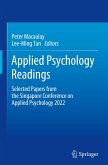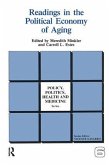Applied Psychology Readings
Selected Papers from Singapore Conference on Applied Psychology, 2017
Herausgegeben:Leung, Man-Tak; Tan, Lee-Ming
Applied Psychology Readings
Selected Papers from Singapore Conference on Applied Psychology, 2017
Herausgegeben:Leung, Man-Tak; Tan, Lee-Ming
- Broschiertes Buch
- Merkliste
- Auf die Merkliste
- Bewerten Bewerten
- Teilen
- Produkt teilen
- Produkterinnerung
- Produkterinnerung
This book is a compilation of the best papers presented at the 2017 edition of the Singapore Conference of Applied Psychology (SCAP), an event held annually in Singapore. Discussing the latest innovations, trends, concerns, practical challenges encountered and the solutions adopted in the field of applied psychology, it is a valuable resource for academics, researchers and practitioners wishing to keep themselves up to date with the state of the art in the field.
Andere Kunden interessierten sich auch für
![Applied Psychology Readings Applied Psychology Readings]() Applied Psychology Readings39,99 €
Applied Psychology Readings39,99 €![Applied Psychology Readings Applied Psychology Readings]() Applied Psychology Readings123,99 €
Applied Psychology Readings123,99 €![Applied Psychology Readings Applied Psychology Readings]() Applied Psychology Readings123,99 €
Applied Psychology Readings123,99 €![Readings in the Political Economy of Aging Readings in the Political Economy of Aging]() Meredith MinklerReadings in the Political Economy of Aging184,99 €
Meredith MinklerReadings in the Political Economy of Aging184,99 €![Family Therapy and Systemic Practice: Readings on Child Protection, Clinical Techniques and Empirical Foundations Family Therapy and Systemic Practice: Readings on Child Protection, Clinical Techniques and Empirical Foundations]() Alan CarrFamily Therapy and Systemic Practice: Readings on Child Protection, Clinical Techniques and Empirical Foundations134,99 €
Alan CarrFamily Therapy and Systemic Practice: Readings on Child Protection, Clinical Techniques and Empirical Foundations134,99 €![Readings in Industrial and Business Psychology Readings in Industrial and Business Psychology]() Harry W. KarnReadings in Industrial and Business Psychology43,99 €
Harry W. KarnReadings in Industrial and Business Psychology43,99 €![Readings in Pediatric Psychology Readings in Pediatric Psychology]() RobertsReadings in Pediatric Psychology41,99 €
RobertsReadings in Pediatric Psychology41,99 €-
-
-
This book is a compilation of the best papers presented at the 2017 edition of the Singapore Conference of Applied Psychology (SCAP), an event held annually in Singapore. Discussing the latest innovations, trends, concerns, practical challenges encountered and the solutions adopted in the field of applied psychology, it is a valuable resource for academics, researchers and practitioners wishing to keep themselves up to date with the state of the art in the field.
Produktdetails
- Produktdetails
- Verlag: Springer / Springer Nature Singapore / Springer, Berlin
- Artikelnr. des Verlages: 978-981-13-5692-6
- Softcover reprint of the original 1st edition 2018
- Seitenzahl: 360
- Erscheinungstermin: 23. Dezember 2018
- Englisch
- Abmessung: 235mm x 155mm x 19mm
- Gewicht: 600g
- ISBN-13: 9789811356926
- ISBN-10: 9811356920
- Artikelnr.: 55098453
- Herstellerkennzeichnung Die Herstellerinformationen sind derzeit nicht verfügbar.
- Verlag: Springer / Springer Nature Singapore / Springer, Berlin
- Artikelnr. des Verlages: 978-981-13-5692-6
- Softcover reprint of the original 1st edition 2018
- Seitenzahl: 360
- Erscheinungstermin: 23. Dezember 2018
- Englisch
- Abmessung: 235mm x 155mm x 19mm
- Gewicht: 600g
- ISBN-13: 9789811356926
- ISBN-10: 9811356920
- Artikelnr.: 55098453
- Herstellerkennzeichnung Die Herstellerinformationen sind derzeit nicht verfügbar.
Dr. Leung Man-Tak Mike is currently an Assistant Professor of Counselling and Psychology at the Hong Kong Shue Yan University. Dr. Leung obtained his PhD in Educational Psychology from the Chinese University of Hong Kong and three Master Degrees from Hong Kong University in Educational Assessment, Applied Statistics and Information Technology in Education respectively. Tan Lee Ming has a Masters in Applied Finance from The University of Adelaide and a Bachelor's degree in Statistics from the National University of Singapore. He is currently the conference director at East Asia Research Pte. Ltd and oversees the academic conferences organized by the company. Using his good knowledge in academic publishing, he is the co-editor for numerous proceedings published by the company.
Chapter 1. Musical Accompaniment as a Factor of Psychological Effectiveness of Advertising (Natalia V. Antonova).- Chapter 2. Trauma Amongst TV News Crews: The Protective Function of Crew Solidarity (Jasmine B. MacDonald).- Chapter 3. Fear of Missing Out, Mobile Phone Dependency and Entrapment in Undergraduate Students (Ananya Upreti).- Chapter 4. Re-Evaluation of the Factor Structure of Motivations of Marathoners Scales (MOMS) (I.T. Heazlewood).- Chapter 5. The Diagnostic Criteria of Gambling Disorder of DSM-5 in Chinese Culture: By Confirmatory Factor Analysis (CFA) and Item Response Theory (IRT) (Wing-Yip Chui).- Chapter 6. Locus of Control and Sense of Happiness: A Mediating Role of Self-Esteem? (Ivanna Shubina).- Chapter 7. Factors that Influence the Training Transfer and Maintenance of Conflict Resolution Programs of Healthcare Training and Development Units: A Retrospective Study (Sonya Vandergoot).- Chapter 8. An Assessment of The Socio-cultural Evolution among Selected Filipino Stay at Home Fathers (SAHFs): Basis for Sustainable Plan (Jonathan I. Arante).- Chapter 9. Two Moms in a Home: Lived Experiences of Children with Same-Sex Parents (Lorita Ramirez Mendoza).- Chapter 10. Reflections on the Therapeutic Journey: Uncovering the Layers (Divya Prasad).- Chapter 11. Self-Talk and Autonomy on Well-Structured Problem-Solving (Yuen Hung Katie Lam).- Chapter 12. School Adjustment: The Correlation with Parental Acceptance-Rejection, Achievement Emotion, Academic Achievement and Self-Esteem among Hong Kong Undergraduates (Yuen-Man Cheung).- Chapter 13. Theoretical Components of Workplace Safety Climate and their Implications for Practice (Cassandra Heffernan).- Chapter 14. Interaction of Psychological Contract Violation and Emotional Labour: Recovery of Organizational Trust and Satisfaction (Noriko Okabe).- Chapter 15. Translating Into Practice the Recommendations of a Safety Climate Theory Based Evaluation of Services Provided by Disability Support Workers (JuliaHarries).- Chapter 16. Ups and Downs as Indonesian College Students: Risk and Protective Factors for Psychological Distress (M. Kes Sugiarti).- Chapter 17. Parental Support to Develop Entrepreneurial Characteristics in Teenagers: Views on Self and Spouse (Jenny Lukito Setiawan).- Chapter 18. Imaging Capability, Absorption, Anxiety, Positive and Negative (VVS Shanmukha Priya).- Chapter 19. How Conceptual Metaphors Make Political Iconography: A Focus Group Discussion on the Psychological Aspects (Vishaka Venkat).
Chapter 1. Musical Accompaniment as a Factor of Psychological Effectiveness of Advertising (Natalia V. Antonova).- Chapter 2. Trauma Amongst TV News Crews: The Protective Function of Crew Solidarity (Jasmine B. MacDonald).- Chapter 3. Fear of Missing Out, Mobile Phone Dependency and Entrapment in Undergraduate Students (Ananya Upreti).- Chapter 4. Re-Evaluation of the Factor Structure of Motivations of Marathoners Scales (MOMS) (I.T. Heazlewood).- Chapter 5. The Diagnostic Criteria of Gambling Disorder of DSM-5 in Chinese Culture: By Confirmatory Factor Analysis (CFA) and Item Response Theory (IRT) (Wing-Yip Chui).- Chapter 6. Locus of Control and Sense of Happiness: A Mediating Role of Self-Esteem? (Ivanna Shubina).- Chapter 7. Factors that Influence the Training Transfer and Maintenance of Conflict Resolution Programs of Healthcare Training and Development Units: A Retrospective Study (Sonya Vandergoot).- Chapter 8. An Assessment of The Socio-cultural Evolution among Selected Filipino Stay at Home Fathers (SAHFs): Basis for Sustainable Plan (Jonathan I. Arante).- Chapter 9. Two Moms in a Home: Lived Experiences of Children with Same-Sex Parents (Lorita Ramirez Mendoza).- Chapter 10. Reflections on the Therapeutic Journey: Uncovering the Layers (Divya Prasad).- Chapter 11. Self-Talk and Autonomy on Well-Structured Problem-Solving (Yuen Hung Katie Lam).- Chapter 12. School Adjustment: The Correlation with Parental Acceptance-Rejection, Achievement Emotion, Academic Achievement and Self-Esteem among Hong Kong Undergraduates (Yuen-Man Cheung).- Chapter 13. Theoretical Components of Workplace Safety Climate and their Implications for Practice (Cassandra Heffernan).- Chapter 14. Interaction of Psychological Contract Violation and Emotional Labour: Recovery of Organizational Trust and Satisfaction (Noriko Okabe).- Chapter 15. Translating Into Practice the Recommendations of a Safety Climate Theory Based Evaluation of Services Provided by Disability Support Workers (JuliaHarries).- Chapter 16. Ups and Downs as Indonesian College Students: Risk and Protective Factors for Psychological Distress (M. Kes Sugiarti).- Chapter 17. Parental Support to Develop Entrepreneurial Characteristics in Teenagers: Views on Self and Spouse (Jenny Lukito Setiawan).- Chapter 18. Imaging Capability, Absorption, Anxiety, Positive and Negative (VVS Shanmukha Priya).- Chapter 19. How Conceptual Metaphors Make Political Iconography: A Focus Group Discussion on the Psychological Aspects (Vishaka Venkat).








